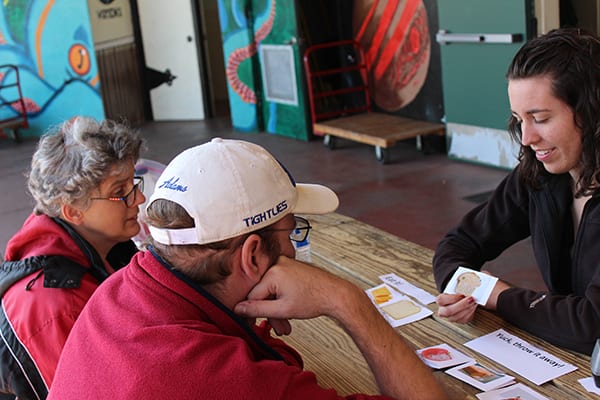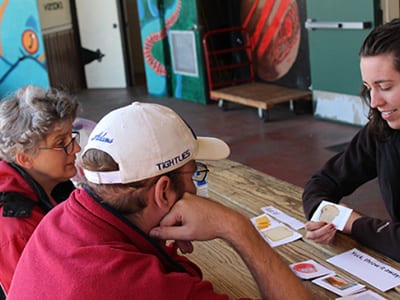By Shannon Carr, Communications & Social Media Specialist
Santa Clara University students are stepping off campus and signing into Morgan Autism Center’s Adult Program for valuable real-life lessons around social justice.
“Making connections beyond the boundaries of their classrooms and our campus, Santa Clara students have found it rewarding to learn with and from the community,” Tam Hixson, Program Director for Santa Clara University’s Community-based Learning, says.

Santa Clara University senior Emily Campi asks Wanda and Julian whether the orange should fall in the “Eat it” or “Yuck, throw it away” category. This is part of the nutrition group she started in the Adult Program while interning through the Arrupe Program.
Photo by Shannon Carr
In collaboration with local community organizations and faculty, she co-manages the Arrupe Weekly
Engagement Program and supports the integration of community engagement to meet learning objectives. Tam also co-supervises the Arrupe Internship Program, facilitating paraprofessional development opportunities for a select cohort of interns each year.
“(This is) an opportunity for them to really get out and learn about the realities of the world that we live in in a very direct and meaningful way,” Tam says.
Since its inception in 1986, partnerships have grown from eight community
organizations involving fewer than 100 students in 10 academic courses to almost 60 community partners throughout Santa Clara County who receive nearly 1,200
students each year, according to the website.
“We really do see our partnership with Morgan Autism Center and all of our community partners as mutually beneficial,” Tam says.
Since 2009, Morgan Autism Center has hosted 22 Santa Clara University undergraduate students through Arrupe.
Jennifer Sullivan, former Executive Director of Morgan Autism Center, says there were many reasons for forming the collaboration.
“In 2009, I was introduced to Shirley Okumura from the Arrupe Center,” she
recalls. “It was the year of our 40th anniversary, and she knew about our partnership with Santa Clara University through our conference, the federal grant SCU received because of our partnership and our teaching of the autism seminar in the summer.”
Jennifer continues: “I was always
looking for opportunities to partner with groups outside our campus, like CSMA, Sacred Heart, St. Nicholas, Red Ladder Theater group, YMCA and others. Because we already had a partnership with SCU, when I heard they had a volunteer program and were looking for places for their students to volunteer, Morgan Autism Center seemed an obvious choice.”
Tam says it has been a win-win
relationship for Santa Clara and Morgan Autism Center.
“It has been an integrated educational experience for students,” she says. “…You can imagine, the course is the lens we want them to look at that experience with.”
For example, juniors Will Holtz and Christina Camoriano are both enrolled in the religious course Architects of Solidarity — led by Professor Phillip Boo Riley — for the Winter quarter, which is paired with Morgan Autism Center. They visit every Wednesday for nearly two hours each during the 10-week course.
“It’s based around working with people in the margins; that’s the way our professor likes to say it,” Will explains. “That entails a lot of things, whether it is the homeless and poor or uneducated or here at the Morgan Autism Center.”
Each week, Will and Christina enjoy talking with clients while they have lunch before engaging in music and cooking activities. They finish the remaining two-hour period with board games. Santa Clara Senior Emily Campi has been visiting Morgan Autism Center since September through the Arrupe Internship Program.
“I’ve had a lot of experience with kids on the autism spectrum specifically, so I just kind of wanted to see what life after childhood looked like for people with these types of disabilities,” Emily says. “So when I saw Morgan Autism Center was an option, I was really excited about it.”
She commits six hours per week in the center’s Adult Program.
“She not only helps wherever she is needed, but has also started to implement her interest in health and nutrition by leading small groups twice a week,” Flo Fuller, the center’s Community Integration Director, says. “They are learning about the food pyramid and how to pack healthy lunches.”
Adult client Wanda, who has been a part of this group, says it has been helpful to her. During a recent session, she pulled a form out of her backpack created by Emily. It allows Wanda to record her meals during a weeklong period, also giving her a space to check the appropriate servings of each food group.
“We have been learning even more about foods that are healthy and not healthy, and about how much healthy foods we should eat and not to eat too much junk food or sugar,” Wanda says.
Emily is also planning to start new groups soon at Morgan Autism Center about hygiene and boundaries.
“I just really appreciate being able to incorporate my academic interests into my internship and doing something that is helpful for the clients in the Adult Program,” Emily says. “It has been great to see the connection between my academic life and real life, and see it come into action.”
Close bonds formed
The Santa Clara University students have also developed friendships with Morgan Autism Center clients through the program.
“Working with Chris and Jonathan has been a lot of fun,” Will says. “This is usually the table I try and pick.”
Jonathan chimes in: “I’ve also enjoyed talking with him about country music. I told him I am going to try and get tickets to the next Darius Rucker concert.”
Emily shares similar sentiments about forming close bonds with clients Matty and Stu, the first of which was formed quickly and the latter gradually.
“We play Uno every day that I’m here,” she says about Matty. “He will come and hover with his Uno cards and wait for me to ask if he would like to play. It’s always kind of the highlight of my day. I love playing Uno with Matty.”
With Stu, however, the friendship formed gradually.
“I remember one time we’d gone to yoga and she let me hold her bear, and that was the big indicator that I was in with her and we were good,” Emily recalls. “Since then, I go sit with her at lunch sometimes and chat with her.”
Christina says while she hasn’t delved into deep relationships with anyone specific yet, the program has taught her lifelong lessons. She compares it to her education as a public health major with hopes to one day have a career in physical therapy.
“So I probably won’t be working with people with autism but I think it’s definitely a great experience and I’ve learned a lot from it so far in terms of just learning that every person is different and has their own individual needs,” Christina says.
She continues: “Whether that’s learning how to live with autism or learning how to live with an injury with physical therapy, I think just understanding that every individual is different and has different needs and different lifestyles and personalities is something that I will definitely take away.”
Jennifer also believes the relationships go beyond the importance of friendship.
“The more people that get to know our program and our students and clients, the better they will understand the issues surrounding those with autism,” she says. “This leads to better acceptance so our students and clients become more a part of the community and not separate.”
“Because social relationships are difficult for people with autism, it is a rare gift to have such an opportunity,” Jennifer continues, in closing. “To watch the SCU students figure out how to interact with our clients and bridge the sometimes difficult interactions is wonderful. And when both our clients and the SCU students start to figure each other out and begin to truly enjoy each other’s company, it is a marvel.”
For more information about the Arrupe Program, visit www.scu.edu/ic/cbl/overview.cfm



Recent Comments